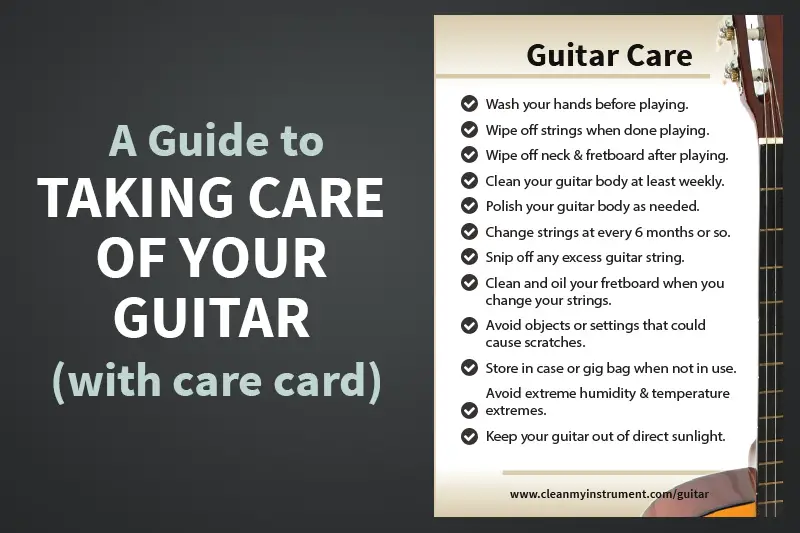The acoustic guitar is a versatile instrument musically, and is relatively durable and inexpensive – all great reasons to own and play. As a guitarist yourself, you probably love the sound and feel of the guitar in your hands. So I don’t think I’m going out on a limb here to say that you want to do everything you can to take care of your guitar, as long as it’s not too much work.
By following the tips below to take care of your guitar, it will sound better, the strings will last longer, your guitar will require less repairs, and will look better overall. Also, as a bonus to help you even more, I’ve created a guitar care card that you can print off for reference!
How To Take Care Of Your Guitar
 Wash your hands before playing.
Wash your hands before playing.- Wipe down strings before and after playing.
- Wipe down neck and fretboard after playing.
- Clean your guitar body at least weekly.
- Polish your guitar as needed.
- Change strings at least every 6 months.
- Snip off any excess guitar string.
- Clean and oil fretboard when you change your strings.
- Avoid objects or settings that could cause scratches.
- Store in case or gig bag when not in use.
- Take off the guitar strap when storing.
- Avoid extreme humidity & temperature extremes.
- Keep your guitar out of direct sunlight.
We’ll cover each of these care tips in detail below. For quick reference, make sure to download our free guitar care card. For guitar teachers, save some time by downloading the (coming soon) 4-card-per-page version on Etsy for just $2.
Keeping Your Guitar Clean
By making sure your guitar is clean, the strings will last longer and there will be less wear on your guitar. For an in-depth look at cleaning your guitar, check out our articles for cleaning the strings, fretboard, and bridge.
- Wash your hands before playing. Hands may have sweat, oils, dander, or other residue from what you’ve come into contact with. A quick hand washing will keep all of that off your strings.
- Wipe off your guitar strings before and after you play. Just spend 8 seconds to wipe the strings down before you play to remove any dust or dander that has settled on them, and then after you play to remove any sweat, skin, oils etc. This quick routine will extend the life of your strings. To read more, check out our article on cleaning guitar strings.
- Also, wipe down the neck and fretboard after you play.As you play, your guitar’s neck and fretboard are getting a lot of use. To reduce grime buildup on the frets and protect the finish, wipe down the entire neck after you play. It just takes a few seconds and you can use the same cloth used for wiping down your strings.
- Clean your guitar body at least once a week. Use a clean, dry, lint-free cloth to wipe down the back, sides, and top of the guitar. Then, wipe down the headstock and neck. You can use a damp cloth (not wet) to more easily remove any grime. For a deeper clean, check out our article on using naptha for guitar cleaning.
- Polish your guitar body as it needs it. Every few weeks, or when it needs a good shine, polish your guitar by applying the guitar polish to a cloth and then wipe down all the wood with it, making sure to not get any on your hardware or strings. Wipe off any excess polish. We recommend either Dunlop’s Guitar Polish or Kyser’s Wood Polish.
Guitar Maintenance
- Change your guitar strings at least every 6 months. 6 months is a general rule of thumb if you’re playing your guitar regularly. If you don’t get to play much, you may get away with replacing your strings every year or two. Over time, your strings will age and stretch so if you are having to tune your guitar often, or you’ve already lost a string, it’s time to purchase new strings. Not sure what strings to buy? Check out our article on which guitar strings are best for beginners and after that, read about how to restring your guitar.
- Snip off any excess guitar string – guitar string is sharp! After you restring your guitar and have your guitar tuned, snip off any excess string to avoid getting stabbed or losing an eye (yes, it has happened).
- Clean and oil your fretboard as you change out your strings. Even though you wipe down your fretboard after each playing session (or should), there will be buildup on the frets and the perfect time to clean and condition your fretboard is when the strings are already off. Use a toothbrush to scrub off any buildup and then wipe down the fretboard with a slightly damp cloth. Then, with a different cloth, apply a fretboard conditioner or lemon oil. Wipe off any excess oil. For more in-depth instructions, read our guide on cleaning guitar fretboards.
Protecting Your Guitar
- Avoid objects or settings that could cause scratches or dings to your guitar. Avoid sharp rings, belt buckles or metal apparel that could cause damage to your guitar. Also, don’t leave your guitar in a spot where it can get knocked over, spilled on, or otherwise easily damaged. Even if you’re taking a quick break, be careful where you set your guitar. You wouldn’t want to lean it up against the couch and have it slip and fall as soon as you step away. Instead, I’d recommend picking up a guitar stand so you know that it’s safe and not going anywhere.
- Store your guitar in a case or gig bag when not in use. If you don’t already have a guitar case or gig bag, get one. It’ll protect your guitar against dust, spills, dings, and moisture to extend the life of your guitar. If you’re looking for a case, we have several recommendations at the bottom of our article on cleaning guitar cases.
- Consider taking off the guitar strap when storing. This is minor but many straps will hurt the finish of your guitar. When storing your guitar, simply remove the strap, or purchase a cotton strap.
- Avoid humidity and temperature extremes. High or low humidity can negatively affect the wood in your guitar wither causing it to warp or crack. Temperature extremes can hurt it as well. Store your guitar in a place that maintains room temperature and has humidity ranges in the 40-55% range. Use a hygrometer to measure the humidity, a dehumidifier to lower it, and a humidifier to raise the moisture level.
- Keep your guitar out of direct sunlight. Over time, direct sunlight can cause your finish to fade and can even crack, by drying out the wood. They don’t make sunblock for guitars, so keep your guitar out of the sun!
- Loosen the strings during long breaks. If you’re going to be taking an extended break from playing your guitar, you may want to loosen your strings a bit. Leaving your strings tight will stretch out your strings over time and constantly puts pressure on the neck of your guitar.
A Couple of Other Tips
Here’s a few more tips:
- Clean your guitar case from time to time. Over time, the outside of your case can get filthy and frankly embarrassing. Read our article on cleaning guitar cases and gig bags.
Final Thoughts
By following these tips and maintaining proper care of your guitar, you’ll keep your guitar in prime working condition, cleaner, and looking great. You’ll also be reducing the number of times you have to visit a luthier.
Make sure to check out our articles on cleaning and maintaining your guitar – they are well worth the read. You may want to also see our recommended guitar gear and supplies.
Happy playing!


